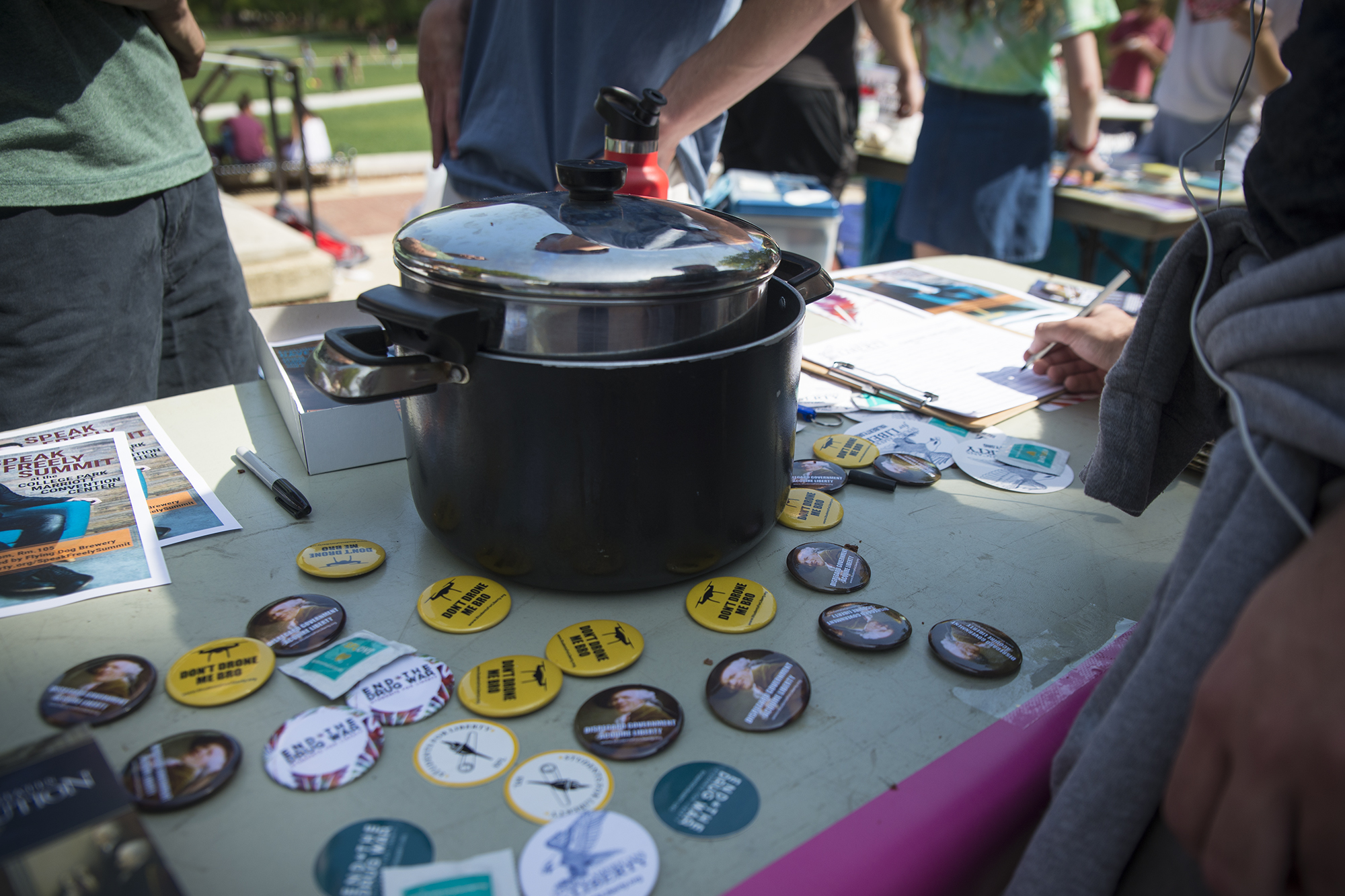A coalition of University of Maryland student groups convened outside McKeldin Library on Thursday to advocate for the legalization of marijuana and other drugs.
Students for Sensible Drug Policy organized the rally with the support of several other student groups, including Our Revolution and Students for Liberty, to raise awareness about how “disastrous the drug war has been” and to call on the administration to change its policies surrounding student drug use, said Yusuf Mahmood, a sophomore economics and philosophy major who co-leads SSDP.
Bands played acoustic music, students tie-dyed shirts with the word “Legalize” emblazoned on the front, and event organizers handed out free “pot brownies” — that is, regular brownies served from a cooking pot — to students strolling by on marijuana’s unofficial holiday.
Mahmood said drugs should be legal because the war on drugs is worse than the drugs themselves, so people aren’t punished for what they choose to do with their bodies.
[Read more: Democratic Maryland lawmakers are fighting to legalize recreational marijuana]
“We’re not endorsing the use of drugs,” said Maille O’Donnell, a sophomore environmental science and policy major who co-leads SSDP. “We want to emphasize that legality and morality are not the same things … We’re basically trying to highlight the dangers of prohibition and that legalization is the best route forward in terms of preventing” violence, reducing harm and expanding medical research.
While SSDP advocates for the legalization of all drugs, not all the student groups involved held the same stance.
Christopher Walkup, a member of Our Revolution, said his group was mainly targeting the “decriminalization and legalization of marijuana” and the impact of the drug on “our broken criminal justice system.”
Walkup, a senior government and politics and theatre major, said the administration should consider changing its drug policy “so the police are not the first people contacted when a perfectly harmless drug is being used on campus.” Resident assistants are required to notify the police when they smell marijuana coming from a student’s room.
[Read more: It’s 4/20 and UMD students want to tell you why weed should be legal]
Rather than resort to turning over the situation to law enforcement and punishing the student, Mahmood said the drug policy should more closely mirror the alcohol policy, which requires freshmen undergo AlcoholEdu training, an “interactive, online program designed to inform students about how alcohol affects the body, mind, perceptions, and behaviors,” according to the Division of Student Affair’s website.
“We aren’t just taught how to abstain from drinking, we are taught how to drink safely,” Mahmood said, adding that drugs should be included in this training as well.
“If someone has a problem with a drug, no matter what the drug is — alcohol, heroin or marijuana — then the best policy is to try to reduce harm and try to help these people rather than call the police on them,” Mahmood said.
The group advocates for calling the police after signs of drug use at Resident Assistants’ discretion, such as if the person is harming themselves or others. They have also called for training RAs about drug harm reduction techniques.
SSDP’s petition to change this university’s drug policy garnered about 60 signatures from students at the event.
This university’s Student Code of Conduct prohibits unauthorized distribution or possession of any controlled substance or illegal drugs on university premises, according to this university’s drug and alcohol abuse policy. If a student violates this policy, they can be expelled suspended or placed on disciplinary probation.
For the 2015-16 academic year, 122 students were referred to the rights and responsibilities office for violating the campus drug policy and 99 were found responsible. From the 2013 to 2016 academic years, 86 percent of these students were placed on disciplinary probation, 10 percent were placed on suspension withheld and 3 percent were suspended. The remaining 1 percent were given a reprimand.
A student could have suspension withheld by agreeing to alternative sanctions. For example, students can go through the Substance Use Intervention Treatment Program or agree to random drug testing.
This university’s current policies could “induce [students] to be more secretive about their drug problem,” which is the opposite of what the school should want to achieve, Mahmood said.
However, Steve Petkas, the Department of Resident Life’s associate director for student and staff development, said this university’s alcohol and drug policies differ for several reasons. RAs are required to call the police when they smell marijuana because only police officers can take legal custody, dispose and test the composition of a controlled substance. Sometimes other illegal substances are in the mix as well, such as acid or misused prescription pills, he added.
“As much as students like to equate pot and alcohol, it’s not equatable in the terms of classification and handling,” Petkas said.
Moreover, while many states are considering legislation to legalize or decriminalize marijuana, this university is required to uphold federal laws, Petkas said. To change university policy, federal laws would need to change first, he added.
Both student groups and university officials agreed on the dangers of buying drugs in an illegal market. When someone purchases illegal drugs, they are often unaware of the purity of what they are taking, Mahmood said.
Likewise, Petkas said students “don’t always know what they’re buying” when they purchase marijuana, adding that there are about six 911 calls per semester resulting from students suffering from a racing heartbeat, disorientation, anxiety and other effects after a large ingestion of marijuana.
When a student voluntarily asks for assistance when suffering from a drug’s adverse effects, just like with alcohol, they are not held responsible for violations of the drug or alcohol policy, Petkas said. This policy applies to friends who call on behalf of someone as well, he added.



